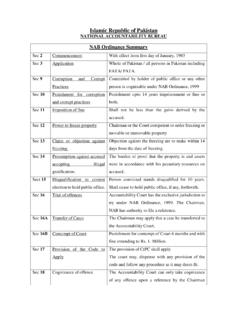Transcription of http://nab.gov.pk/Downloads/Doc/NACS.pdf
1 National Anti-Corruption Strategy (NACS). Islamabad - Pakistan 2002. Foreword A country exists to provide its citizens with freedom from poverty, freedom from servitude and a quality of life where they are able to live without fear of injustice and tyranny. Nothing harms these objectives more than corruption in the organs of the state. The first victim is the development process itself as inequalities get entrenched and law and order breaks down. Corruption in such a country does not remain restricted to one sector; it permeates the whole society.
2 Pakistan has been, unfortunately, a typical case. In the last fifty-five years we have seen an exponential upsurge in the scourge of corruption with perhaps the steepest rise coming in the period 1985 -1999. It was in the nineties that the demand for accountability became more vociferous than ever before. The result of such widespread corruption has been a loss of legitimacy of state institutions. Over many years anti-corruption policy makers have considered it to be a function of enforcement only. The result has been a series of laws and agencies coming up over the years that concentrated on penal action only.
3 Public demand has also advocated an enforcement based approach, hence the slogan of Ehtesab (accountability). However, our experience and that of similar states in the world has revealed that unless the causes of corruption are addressed, the society is empowered to stand up for its rights, and the Political Will to take unpalatable decisions is created, corruption will continue unabated. Unless a comprehensive approach is used, efforts to resurrect the pillars of national integrity system will fail. National Anti-corruption Strategy proposes exactly this approach.
4 NACS belongs to everyone in Pakistan and calls for changing the manner in which we run the affairs of the state with the view to reduce corruption in the society and laying the basis of good governance in the country. Sustainable development will be possible only if we manage to reduce corruption levels to bare minimum, even if eradication remains an elusive goal. There have been a series of studies on corruption even before NACS but they have remained on the shelf. I do not want a similar fate for this report. I have personally taken the onus of ensuring that the outcome of this one is different.
5 All concerned will be involved in the implementation process. We in NAB are prepared to assist all those who need it but the eventual responsibility for implementation lies with the stakeholders themselves. In fact it is the latter aspect, which differentiates NACS from the older studies. We went to the stakeholders, elicited their views and finalized the proposals. In all, over three thousand stakeholders were formally consulted while the figure for those contacted informally is much higher. I must acknowledge the support of the President of Pakistan for the Project.
6 His consistent involvement in the process was both a source of encouragement and guidance. I am also grateful to the provincial Governors for their help. The role of the Steering Committee has been most constructive and useful. Finally, the Project Team, led by Brigadier (now Major General) Shujaat Zamir Dar and later by Brigadier Tayyab Waheed deserves the maximum credit for burning the midnight oil and completing the task most ably. Advisors from Atos KPMG Consulting were an integral and important part of this team. The untiring efforts of the Project Manager, Osborne and the role of Mr.
7 Jeremy Carver, the Strategic Advisor are gratefully appreciated. Their commitment to the Project was manifested when they worked on the Project despite an adverse travel advice from British Foreign Office. I would also like to appreciate the services of Mr. Afzal Hayat Mufti for this thorough analysis of the legal and judicial framework; Ms. Sabehia Mohammad for training the Project Team in workshop, focus group and interviewing skills; and Ms. Alison Green for the support she provided to the Team. The core effort came from the Project Team that consisted of young officers from the Government of Pakistan.
8 Their readiness to work for long odd hours, accepting challenging deadlines and learning quickly has been commendable. Perhaps the biggest attribute has been the team spirit, which they managed to infuse right from the beginning. They had the luxury of benefiting from the experience of Mr. WaJahat Latif, the local consultant. I must acknowledge the hard work done by Mr. Munir Ahmad Chishti, Mr. Sultan Azam Tamori, Mr. Amjad Mahmood, Mr. Qasim Raza Khan, Mr. Zafar Iqbal Gondal, Mr. Umar Zafar Sheikh, Mr. Kamran Ahmad and Mr. Abdus Sami Khan the Project Coordinator.
9 Their staff was equally committed and supported the Team throughout. Efforts of officers and staff of NAB who assisted at various stages also need to be recognized especially the Computer & Prosecutor General Accountability (PGA) Wings. We are all indebted to Mr. Kamal Hussain from Bangladesh, Mr. Jeremy Pope from New Zealand, both from the Transparency International, and Barrister Shahzadi Beg from United Kingdom who participated in the two day Federal Workshop at Islamabad and also contributed through valuable advice on recommendations of NACS.
10 If I try to acknowledge every person who contributed the list would be very long. However, as stated earlier, the Report itself belongs to the stakeholders, the hundreds of Pakistani men and women who contributed through their views. The individuals varied from business community, bureaucrats, judges, justices of the higher Judiciary, to slum dwellers and low income groups. One thing was common wherever the Project Team went; there is a very strong desire in the country to eradicate corruption. People are looking at the top leadership, the politicians, the bureaucrats, the military men to deliver.

